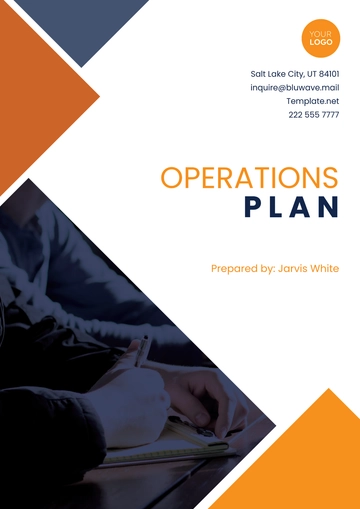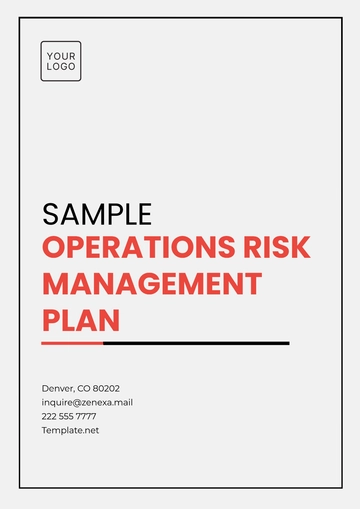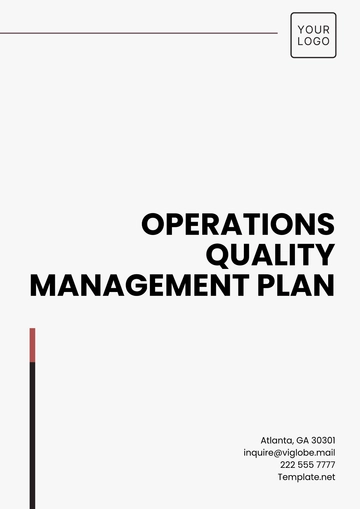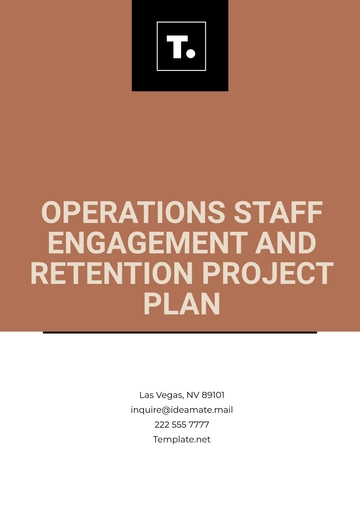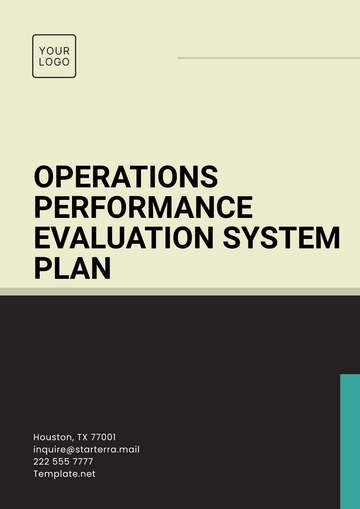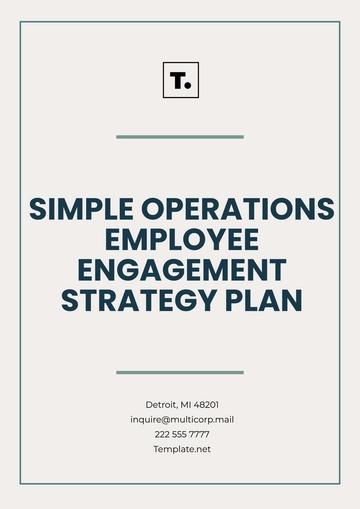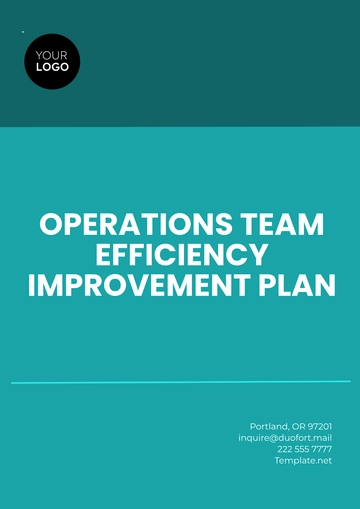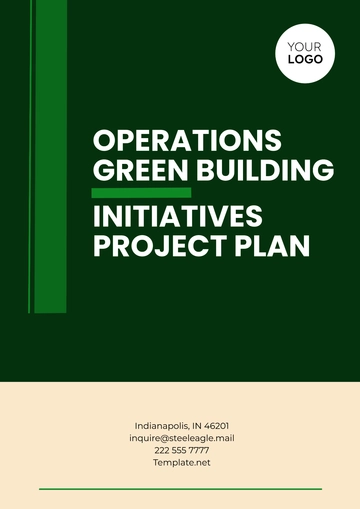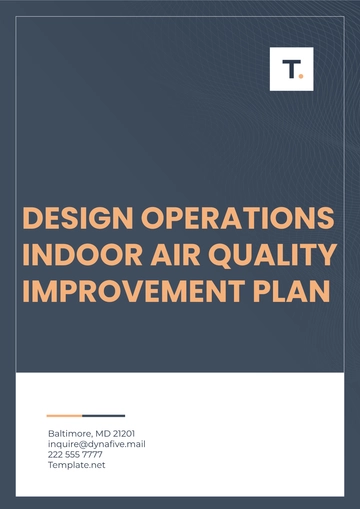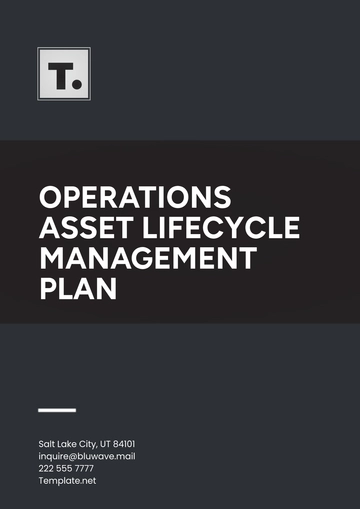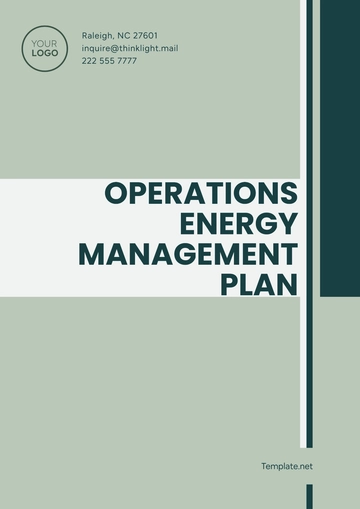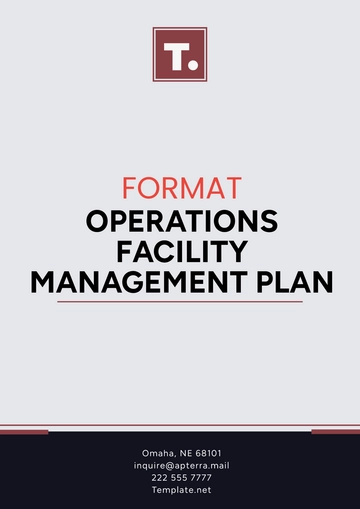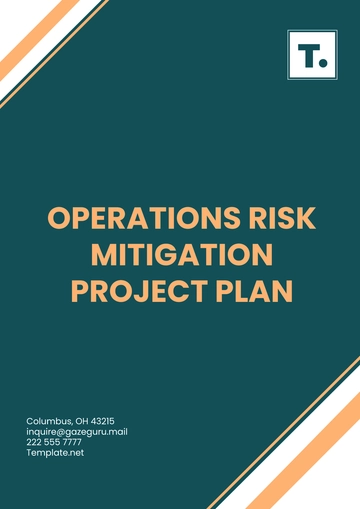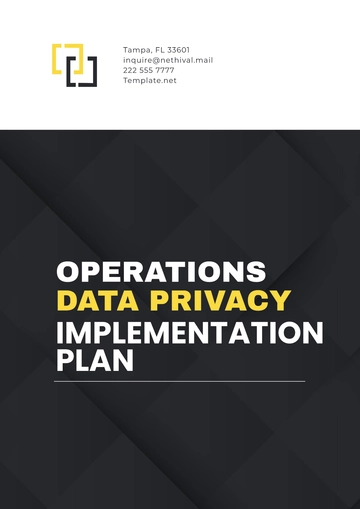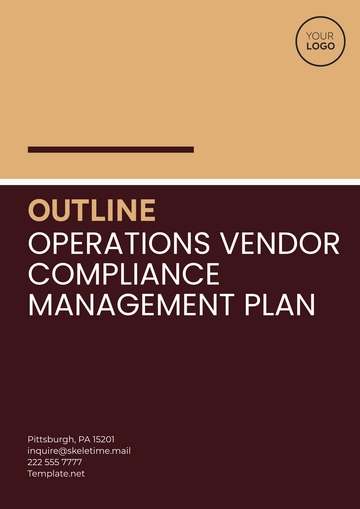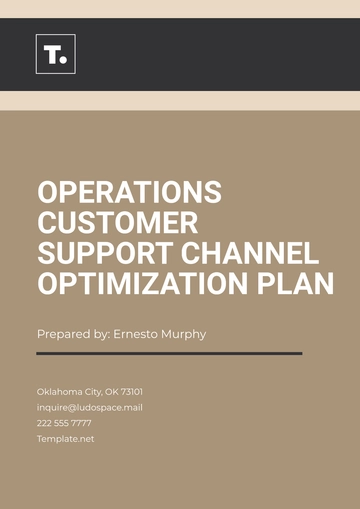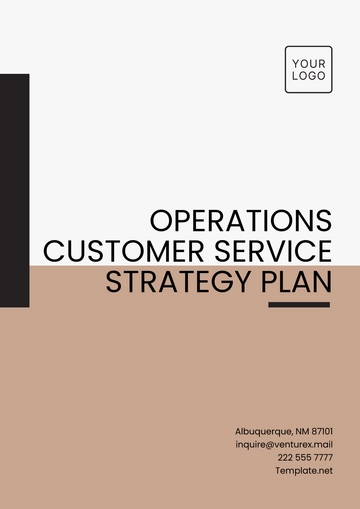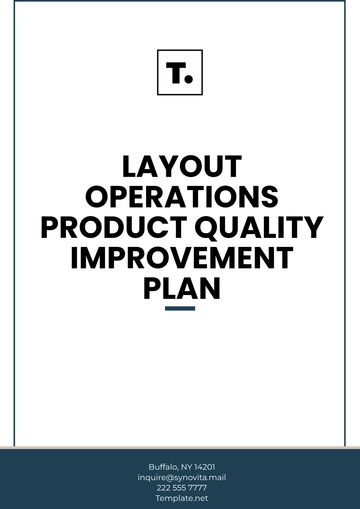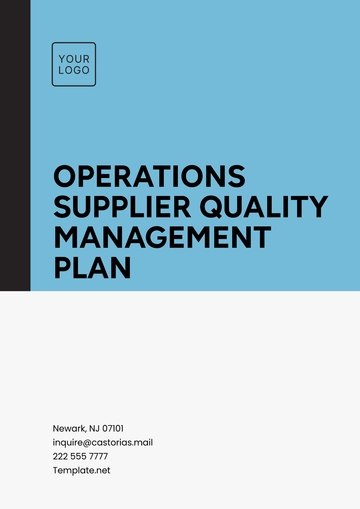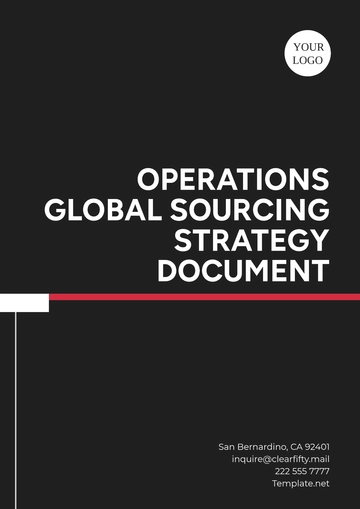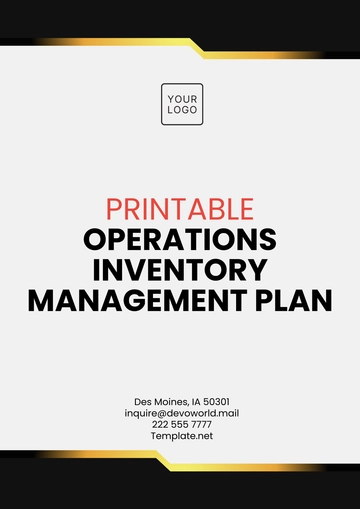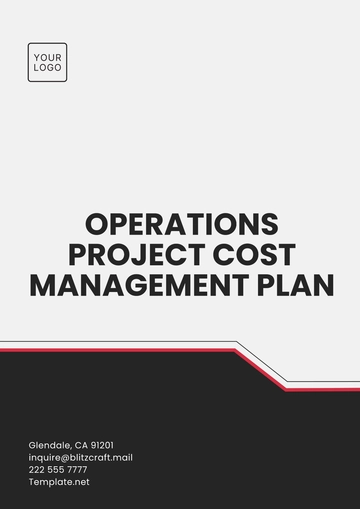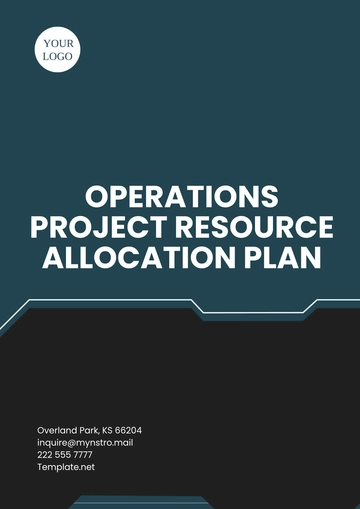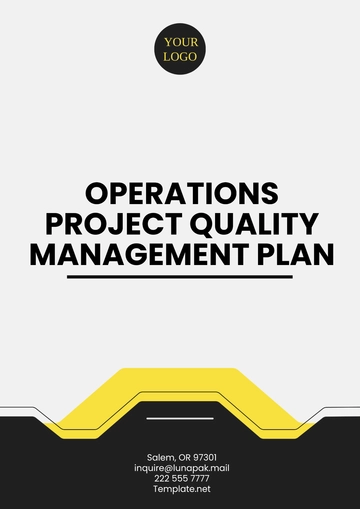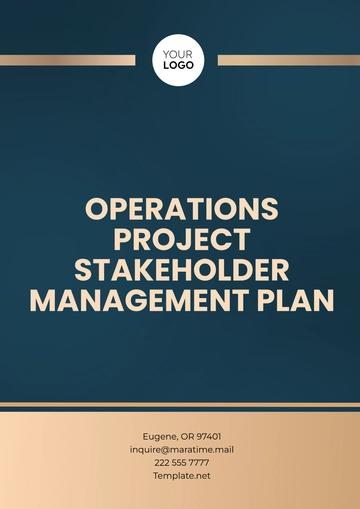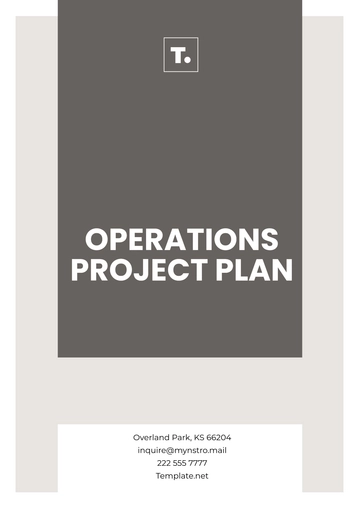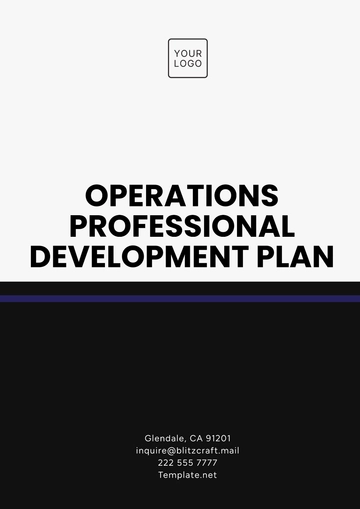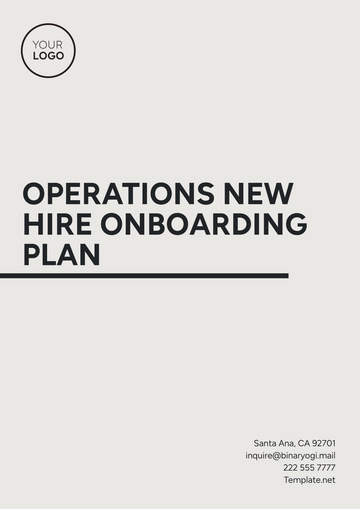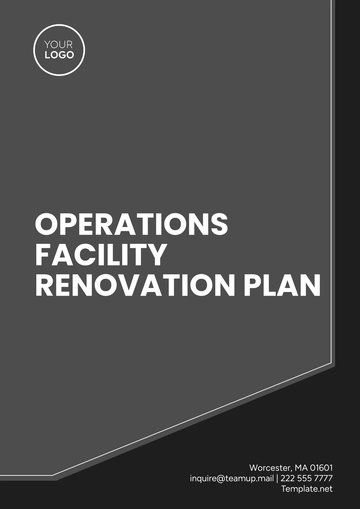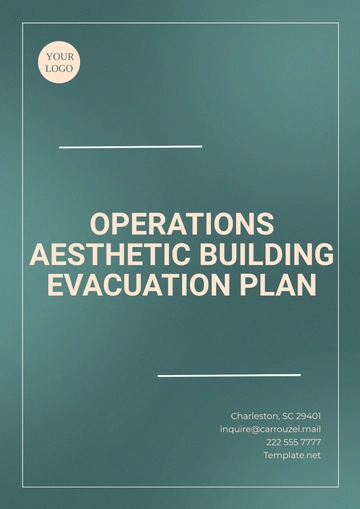Free Hotel Operational Plan
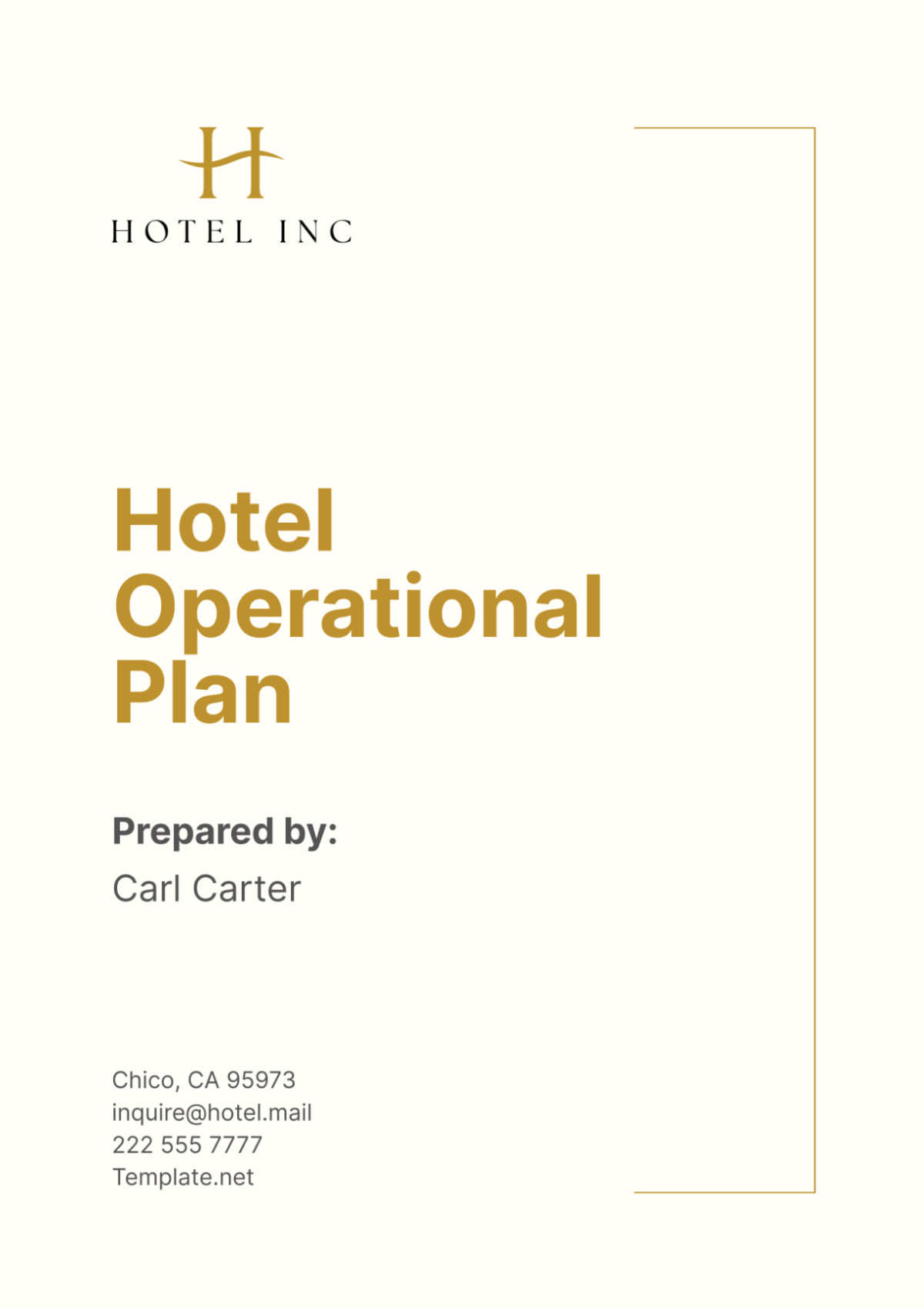
I. Executive Summary
A. Overview of the Hotel
[Your Company Name], is a premier hotel establishment that aims to provide exceptional hospitality services to travelers and guests. Located in the heart of a bustling city, our hotel offers a perfect blend of luxury, comfort, and convenience. With state-of-the-art facilities and a dedicated team of professionals, we strive to create memorable experiences for our guests.
B. Vision and Mission Statements
Vision: To be the leading hotel known for its unparalleled guest experiences and commitment to excellence in hospitality.
Mission: Our mission is to provide our guests with a unique and unforgettable stay by delivering high-quality services, maintaining the highest standards of cleanliness and comfort, and continuously innovating to meet and exceed our guests' expectations.
C. Key Objectives and Goals
Achieve an annual occupancy rate of 85%.
Maintain a guest satisfaction score of 95% or higher.
Increase annual revenue by 10% through strategic marketing and sales initiatives.
Implement sustainable practices to reduce our environmental footprint by 20% over the next three years.
D. Summary of the Operational Plan
This operational plan outlines the strategies and actions [Your Company Name], will implement to achieve its objectives and goals. The plan covers all aspects of hotel operations, including front office, housekeeping, food and beverage, security, human resources, marketing, finance, customer service, technology, sustainability, and risk management.
II. Hotel Description
A. Location and Facilities
[Your Company Name] is strategically located in the city center, providing easy access to major attractions, business districts, and transportation hubs. Our facilities include:
200 luxurious guest rooms and suites
A fine dining restaurant and a casual café
A fully-equipped fitness center and spa
Meeting and conference rooms
An outdoor swimming pool and lounge area
24-hour concierge and room service
High-speed internet access throughout the property
B. Types of Rooms and Amenities
We offer a variety of room types to cater to different preferences and needs:
Room Type | Description | Amenities |
|---|---|---|
Standard Room | Comfortable room with essential amenities | Free Wi-Fi, flat-screen TV, minibar, safe |
Deluxe Room | Spacious room with city views | Complimentary breakfast, premium toiletries |
Suite | Luxurious suite with separate living area | Private balcony, access to the executive lounge |
C. Target Market and Customer Profile
Our target market includes both business and leisure travelers who seek high-quality accommodations and services. The typical customer profile for [Your Company Name] includes:
Business professionals attending conferences and meetings
Families on vacation looking for comfortable and spacious rooms
Couples seeking a romantic getaway
Tourists exploring the city's attractions
D. Competitive Landscape
[Your Company Name] operates in a highly competitive market. Key competitors include other luxury hotels in the area that offer similar amenities and services. To differentiate ourselves, we focus on personalized guest experiences, exceptional customer service, and innovative offerings.
III. Operational Strategies
A. Front Office Operations
The front office is the hub of guest interaction and plays a critical role in shaping the guest experience. Our front office operations include:
Check-in and Check-out Procedures
We have streamlined check-in and check-out procedures to ensure a smooth and efficient process for our guests. Key aspects include:
Online pre-check-in options
Express check-out service
Personalized greetings and welcome amenities
Efficient handling of guest requests and inquiries
Guest Services and Concierge
Our concierge team is dedicated to assisting guests with a wide range of services, including:
Restaurant reservations and recommendations
Transportation arrangements
Tour and activity bookings
Special requests and personalized services
Reservation Management
Effective reservation management is crucial for optimizing occupancy and revenue. Our reservation strategies include:
Dynamic pricing models based on demand and seasonality
Partnership with online travel agencies (OTAs) and direct booking incentives
Regular training for staff on reservation systems and customer service
B. Housekeeping Operations
Housekeeping ensures that our hotel maintains the highest standards of cleanliness and comfort. Key components of our housekeeping operations include:
Cleaning and Maintenance Schedules
We have established comprehensive cleaning and maintenance schedules to ensure guest rooms and public areas are impeccably maintained. Key aspects include:
Daily cleaning of guest rooms and common areas
Regular deep-cleaning and maintenance routines
Use of eco-friendly cleaning products
Inventory Management for Linens and Supplies
Effective inventory management is essential for maintaining adequate stock levels of linens and supplies. Key strategies include:
Regular inventory audits
Automated inventory tracking systems
Vendor partnerships for timely replenishment
Laundry Services
Our laundry services ensure that linens and guest clothing are cleaned and delivered promptly. Key components include:
In-house laundry facility with advanced equipment
Same-day laundry and dry-cleaning services for guests
Strict quality control measures to maintain high standards
C. Food and Beverage Operations
Our food and beverage operations are designed to offer a diverse and delightful culinary experience. Key components include:
Restaurant and Bar Management
We operate a fine dining restaurant and a casual café, each with its unique offerings. Key aspects include:
Seasonal and locally sourced menu items
Professional and courteous service staff
Regular training programs for culinary and service teams
Room Service Procedures
We provide 24-hour room service to cater to our guests' needs at any time. Key procedures include:
Comprehensive room service menu
Efficient order processing and delivery
High standards of food presentation and quality
Menu Planning and Inventory
Effective menu planning and inventory management ensure that we offer fresh and high-quality food items. Key strategies include:
Regular menu reviews and updates based on guest feedback
Close collaboration with suppliers for fresh ingredients
Inventory tracking systems to minimize waste and control costs
D. Security and Safety Operations
Ensuring the safety and security of our guests and staff is a top priority. Key components of our security and safety operations include:
Emergency Procedures and Protocols
We have established comprehensive emergency procedures and protocols to handle various situations. Key aspects include:
Regular training and drills for staff
Clear communication channels and emergency contact lists
Detailed evacuation plans and emergency response teams
Security Staff and Training
Our security team is well-trained and equipped to handle various security situations. Key components include:
24-hour security patrols
Advanced surveillance systems
Regular training programs on security protocols
Health and Safety Standards
We adhere to strict health and safety standards to ensure a safe environment for our guests and staff. Key aspects include:
Regular health and safety audits
Compliance with local and international regulations
Continuous improvement of safety measures based on feedback and best practices
IV. Human Resources Management
A. Staffing Plan and Recruitment
Our staffing plan is designed to ensure we have the right people in the right roles to deliver exceptional service. Key components include:
Recruitment Strategies
Job fairs and partnerships with hospitality schools
Online job postings and social media recruitment
Employee referral programs
Onboarding Process
Comprehensive orientation program for new hires
Introduction to company culture and values
Initial training and mentorship
B. Training and Development Programs
We invest in continuous training and development to ensure our staff delivers the highest standards of service. Key programs include:
Skill Development Workshops
Customer service training
Technical skills for specific roles
Leadership and management training
Performance Evaluation and Feedback
Regular performance reviews
Constructive feedback and development plans
Recognition and reward programs
C. Employee Roles and Responsibilities
Clearly defined roles and responsibilities ensure that each team member understands their duties and expectations. Key components include:
Job Descriptions
Detailed job descriptions for all positions
Clear reporting lines and accountability
Regular updates to reflect changing needs and roles
Team Collaboration
Cross-functional team meetings
Collaborative projects and initiatives
Open communication channels
D. Employee Retention Strategies
We aim to create a positive and supportive work environment to retain our talented staff. Key strategies include:
Competitive Compensation and Benefits
Fair and competitive salaries
Comprehensive benefits package
Performance-based incentives
Work-Life Balance
Flexible work schedules
Employee wellness programs
Supportive workplace culture
V. Marketing and Sales Strategies
A. Branding and Positioning
Our branding and positioning strategies are designed to establish [Your Company Name], a Hotel Company, as a leader in the hospitality industry. Key components include:
Brand Identity
Consistent brand messaging and visuals
Strong online presence through a well-designed website and social media channels
Unique selling propositions (USPs) that differentiate us from competitors
Market Positioning
Identifying and targeting specific market segments
Highlighting our unique features and benefits
Establishing a strong reputation for quality and service
B. Advertising and Promotions
Effective advertising and promotional strategies help us reach a wider audience and attract more guests. Key strategies include:
Online Advertising
Pay-per-click (PPC) campaigns
Social media advertising
Search engine optimization (SEO)
Traditional Advertising
Print advertisements in travel magazines and local newspapers
Billboard and outdoor advertising
Radio and television commercials
Promotions and Special Offers
Seasonal and holiday promotions
Loyalty programs and repeat guest discounts
Partnerships with local businesses and attractions
C. Online Presence and Social Media
A strong online presence and active social media engagement are crucial for reaching modern travelers. Key components include:
Website Optimization
User-friendly and mobile-responsive website
High-quality content and visuals
Online booking engine and special offers
Social Media Engagement
Regular posts and updates on platforms like Facebook, Instagram, and Twitter
Engaging content such as behind-the-scenes looks and guest stories
Social media advertising and influencer collaborations
D. Partnerships and Collaborations
Collaborating with other businesses and organizations helps us expand our reach and enhance our offerings. Key strategies include:
Local Partnerships
Collaborations with local tour operators and attractions
Special packages and promotions with nearby restaurants and shops
Participation in local events and festivals
Corporate Collaborations
Partnerships with businesses for corporate rates and services
Hosting corporate events and meetings
Providing tailored services for business travelers
E. Customer Relationship Management (CRM)
Effective CRM strategies help us build and maintain strong relationships with our guests. Key components include:
Guest Data Management
Collecting and analyzing guest data to understand preferences and behavior
Personalized marketing and communication based on guest profiles
Maintaining a secure and confidential database
Loyalty Programs
Rewarding repeat guests with exclusive benefits and discounts
Encouraging guest referrals and word-of-mouth marketing
Regularly updating and enhancing loyalty program features
Feedback and Improvement
Soliciting guest feedback through surveys and reviews
Analyzing feedback to identify areas for improvement
Implementing changes based on guest suggestions and feedback
VI. Financial Management
Financial management is a critical component of [Your Company Name] ensuring that the hotel's financial resources are effectively utilized to achieve our business objectives and maintain profitability. This section outlines our approach to budgeting, revenue management, cost control, financial reporting, and funding strategies.
A. Budgeting and Forecasting
Our budgeting and forecasting process is designed to provide a clear financial roadmap for the hotel, aligning with our strategic goals. The budgeting process involves:
Annual Budget Preparation: Each department prepares its budget, which includes expected revenues and expenses. These departmental budgets are consolidated into the hotel's overall budget, ensuring alignment with our financial goals.
Quarterly Forecasting: We review and update our financial forecasts on a quarterly basis to account for changes in market conditions, operational needs, and unexpected expenses. This allows us to make informed adjustments to our financial plans.
B. Revenue Management and Pricing Strategy
Revenue management is essential for optimizing our hotel's profitability. Our pricing strategy is based on dynamic pricing models, which consider factors such as demand, seasonality, and competitor rates. Key components of our revenue management strategy include:
Demand Forecasting: We use historical data, market trends, and advanced analytics to forecast demand and set optimal room rates. This helps us maximize occupancy and revenue.
Rate Management: We continuously monitor and adjust room rates based on real-time market conditions. This includes implementing promotional rates, package deals, and special offers to attract different customer segments.
Channel Management: We manage multiple distribution channels, including our website, online travel agencies (OTAs), and direct bookings, to ensure we reach a broad audience while maintaining rate parity.
C. Cost Control and Expense Management
Effective cost control is crucial for maintaining profitability. We implement various strategies to manage and reduce operational expenses without compromising service quality:
Expense Monitoring: We track expenses regularly and compare them against our budget to identify any variances. This allows us to take corrective actions promptly.
Vendor Management: We negotiate favorable terms with suppliers and vendors to ensure we receive the best value for our purchases. This includes bulk purchasing and long-term contracts for cost savings.
Energy and Resource Efficiency: We invest in energy-efficient technologies and sustainable practices to reduce utility costs and minimize waste.
D. Financial Reporting and Analysis
Accurate financial reporting and analysis provide insights into our hotel's financial performance, helping us make informed decisions. Our financial reporting process includes:
Monthly Financial Statements: We prepare and review income statements, balance sheets, and cash flow statements on a monthly basis. These reports provide a detailed overview of our financial health.
Key Performance Indicators (KPIs): We track and analyze KPIs such as RevPAR (Revenue per Available Room), GOP (Gross Operating Profit), and ADR (Average Daily Rate) to assess our performance and identify areas for improvement.
Variance Analysis: We conduct variance analysis to compare actual financial performance against our budget and forecasts. This helps us understand the reasons behind any discrepancies and take corrective actions.
E. Funding and Investment Plans
To support our growth and expansion, we have a strategic approach to funding and investment. This includes:
Capital Investment: We allocate funds for capital projects such as renovations, technology upgrades, and facility improvements. These investments enhance our hotel's appeal and operational efficiency.
Funding Sources: We explore various funding sources, including bank loans, equity financing, and internal cash flow, to finance our projects. We maintain a balanced capital structure to manage financial risk.
Return on Investment (ROI) Analysis: We evaluate the potential ROI of investment opportunities to ensure they align with our financial goals and provide long-term value.
VII. Customer Service and Quality Management
At [Your Company Name] exceptional customer service and high-quality standards are the cornerstones of our success. This section outlines our strategies for measuring guest satisfaction, handling feedback, ensuring quality assurance, and implementing continuous improvement initiatives.
A. Guest Satisfaction Measurement
Measuring guest satisfaction is essential for understanding our guests' experiences and identifying areas for improvement. Our approach includes:
Guest Surveys: We conduct post-stay surveys to gather feedback on various aspects of our guests' experiences, including room comfort, cleanliness, service quality, and overall satisfaction.
Online Reviews: We monitor online review platforms such as TripAdvisor, Google Reviews, and Agoda to understand guest sentiment and identify trends in feedback.
Net Promoter Score (NPS): We use NPS to measure guest loyalty and their likelihood of recommending our hotel to others. This metric provides valuable insights into our guests' overall satisfaction.
B. Handling Customer Feedback and Complaints
Effectively handling customer feedback and complaints is crucial for maintaining guest satisfaction and loyalty. Our approach includes:
Prompt Response: We ensure that all guest feedback and complaints are addressed promptly and professionally. This includes acknowledging the feedback, investigating the issue, and providing a resolution.
Guest Relations Team: Our dedicated guest relations team is responsible for managing feedback and complaints. They are trained to handle difficult situations with empathy and professionalism.
Follow-Up: We follow up with guests after resolving their complaints to ensure they are satisfied with the outcome and to reinforce our commitment to excellent service.
C. Quality Assurance Programs
Quality assurance programs help us maintain high standards of service and operational excellence. Key components include:
Standard Operating Procedures (SOPs): We have detailed SOPs for all operational areas to ensure consistency and adherence to best practices. These SOPs are regularly reviewed and updated.
Regular Audits: We conduct regular internal and external audits to assess compliance with our quality standards. These audits cover areas such as cleanliness, safety, and service delivery.
Training Programs: Continuous training ensures that our staff is knowledgeable and skilled in delivering high-quality service. This includes regular refresher courses and specialized training sessions.
D. Continuous Improvement Strategies
Continuous improvement is embedded in our operational philosophy. We use various strategies to drive ongoing enhancements:
Benchmarking: We benchmark our performance against industry standards and best practices to identify areas for improvement and implement effective solutions.
Guest Feedback Analysis: We analyze guest feedback to identify recurring issues and trends. This information is used to develop action plans for addressing root causes and enhancing our services.
Innovation and Technology: We embrace innovation and technology to improve our operations and guest experiences. This includes adopting new technologies for better service delivery and operational efficiency.
VIII. Technology and Systems
Technology plays a vital role in enhancing the guest experience and streamlining our hotel operations. This section outlines our approach to property management systems, reservation and booking systems, point of sale systems, IT infrastructure, and data management.
A. Property Management System (PMS)
Our Property Management System (PMS) is the backbone of our hotel operations, providing a centralized platform for managing reservations, guest information, billing, and other critical functions. Key features include:
Integrated Solutions: Our PMS integrates with other systems such as revenue management, CRM, and accounting, ensuring seamless data flow and operational efficiency.
Real-Time Data: The system provides real-time data on room availability, guest preferences, and financial transactions, enabling informed decision-making.
Customization: The PMS is customizable to meet our specific needs, allowing us to tailor features and workflows to our hotel's unique requirements.
B. Reservation and Booking Systems
Efficient reservation and booking systems are essential for maximizing occupancy and revenue. Our approach includes:
Online Booking Engine: Our website features an easy-to-use online booking engine that allows guests to make reservations directly, view available rooms, and take advantage of special offers.
Channel Management: We use a channel management system to synchronize our room inventory across multiple distribution channels, including OTAs, GDS (Global Distribution Systems), and our direct booking platform.
Mobile Accessibility: Our reservation system is mobile-friendly, ensuring that guests can make bookings and manage reservations from their smartphones and tablets.
C. Point of Sale (POS) Systems
Our Point of Sale (POS) systems are designed to streamline transactions and enhance the guest experience in our food and beverage outlets. Key features include:
Integrated Payment Processing: The POS systems integrate with our PMS and accounting systems, ensuring accurate and efficient payment processing and billing.
Inventory Management: The systems track inventory levels in real-time, helping us manage stock and reduce waste.
Detailed Reporting: The POS systems provide detailed sales reports, helping us analyze performance and make informed decisions about menu offerings and pricing.
D. IT Infrastructure and Support
A robust IT infrastructure is essential for supporting our technology systems and ensuring smooth operations. Key components include:
Network Security: We implement advanced security measures to protect our network and data from cyber threats. This includes firewalls, encryption, and regular security audits.
IT Support: Our IT support team is available 24/7 to address any technical issues and ensure minimal disruption to our operations.
Scalability: Our IT infrastructure is designed to be scalable, allowing us to expand and upgrade our systems as our needs evolve.
E. Data Management and Security
Effective data management and security are critical for protecting guest information and ensuring compliance with regulations. Our approach includes:
Data Privacy: We adhere to strict data privacy policies to protect guest information. This includes compliance with GDPR (General Data Protection Regulation) and other relevant regulations.
Data Backup: We regularly back up our data to ensure that it is safe and recoverable in case of any system failures or disasters.
Data Analytics: We use data analytics to gain insights into guest preferences, operational performance, and market trends. This information helps us make informed decisions and improve our services.
IX. Sustainability and Environmental Practices
Sustainability is a core value at [Your Company Name]. We are committed to implementing environmentally friendly practices that reduce our ecological footprint and promote sustainable development. This section outlines our energy conservation, waste reduction, water conservation, and sustainable sourcing strategies.
A. Energy Conservation Initiatives
Energy conservation is a key focus of our sustainability efforts. We implement various initiatives to reduce energy consumption and increase efficiency:
Energy-Efficient Lighting: We use LED lighting throughout the hotel, which consumes less energy and has a longer lifespan compared to traditional bulbs.
HVAC Systems: Our heating, ventilation, and air conditioning (HVAC) systems are optimized for energy efficiency, with regular maintenance and upgrades to ensure peak performance.
Renewable Energy: We explore opportunities to incorporate renewable energy sources, such as solar panels, to reduce our reliance on non-renewable energy.
B. Waste Reduction and Recycling Programs
Reducing waste and promoting recycling are essential components of our environmental strategy. Key programs include:
Waste Segregation: We implement waste segregation practices to ensure that recyclable materials are properly sorted and processed.
Composting: Organic waste from our food and beverage operations is composted, reducing landfill waste and producing nutrient-rich compost for landscaping.
Recycling Initiatives: We encourage guests and staff to participate in our recycling programs by providing clearly marked recycling bins and educating them on proper recycling practices.
C. Water Conservation Measures
Water conservation is critical for sustainable operations. Our water conservation measures include:
Low-Flow Fixtures: We install low-flow faucets, showerheads, and toilets in guest rooms and public areas to reduce water consumption.
Laundry Practices: Our laundry facilities use water-efficient washing machines, and we offer guests the option to reuse towels and linens to reduce water usage.
Rainwater Harvesting: We explore opportunities for rainwater harvesting to supplement our water supply for landscaping and other non-potable uses.
D. Sustainable Sourcing and Procurement
Sustainable sourcing ensures that the products and services we use align with our environmental values. Our approach includes:
Local and Organic Products: We prioritize sourcing local and organic products for our food and beverage operations, reducing our carbon footprint and supporting local farmers.
Eco-Friendly Supplies: We choose eco-friendly cleaning products, toiletries, and other supplies that have minimal environmental impact.
Vendor Partnerships: We work with vendors and suppliers who share our commitment to sustainability and adhere to environmentally responsible practices.
X. Risk Management and Contingency Planning
Risk management and contingency planning are essential for ensuring the resilience and continuity of our hotel operations. This section outlines our approach to identifying and mitigating risks, developing contingency plans, and ensuring business continuity.
A. Risk Identification and Assessment
Identifying and assessing potential risks is the first step in effective risk management. Our approach includes:
Risk Mapping: We conduct comprehensive risk assessments to identify potential threats to our operations, including natural disasters, security breaches, and operational disruptions.
Impact Analysis: We evaluate the potential impact of identified risks on our operations, finances, and reputation, prioritizing them based on their severity and likelihood.
B. Mitigation Strategies
We implement various strategies to mitigate identified risks and minimize their impact on our operations:
Preventive Measures: We take proactive measures to prevent risks, such as implementing robust security protocols, conducting regular maintenance, and adhering to safety standards.
Insurance Coverage: We maintain comprehensive insurance coverage to protect against financial losses resulting from unforeseen events.
Staff Training: We provide regular training for staff on risk management and emergency response procedures, ensuring they are prepared to handle various situations.
C. Contingency Planning
Contingency planning ensures that we can respond effectively to emergencies and disruptions. Our approach includes:
Emergency Response Plans: We develop detailed emergency response plans for various scenarios, including fire, natural disasters, and medical emergencies. These plans outline specific actions to be taken by staff and guests.
Business Continuity Plans: We create business continuity plans to ensure that critical operations can continue in the event of a disruption. This includes identifying essential functions, establishing backup systems, and planning for alternative work arrangements.
Communication Plans: Effective communication is crucial during emergencies. We establish clear communication channels and protocols to keep staff and guests informed and coordinated.
D. Crisis Management Team
Our crisis management team is responsible for overseeing our response to emergencies and disruptions. Key responsibilities include:
Incident Command: The team provides leadership and coordination during emergencies, ensuring that response actions are carried out efficiently.
Resource Allocation: The team manages resources, including personnel, equipment, and supplies, to support emergency response efforts.
Recovery Planning: The team leads efforts to restore normal operations as quickly as possible following a disruption, including conducting post-incident reviews and implementing improvements.
XI. Monitoring and Evaluation
Monitoring and evaluation are essential for assessing the effectiveness of our operational strategies and ensuring continuous improvement. This section outlines our approach to performance monitoring, evaluation methods, and reporting.
A. Performance Monitoring
Regular monitoring of key performance indicators (KPIs) allows us to track our progress and identify areas for improvement. Our approach includes:
Operational KPIs: We monitor KPIs such as occupancy rates, RevPAR, guest satisfaction scores, and employee performance metrics to assess our operational efficiency and effectiveness.
Financial KPIs: We track financial KPIs such as revenue growth, profit margins, and expense ratios to evaluate our financial performance and profitability.
Sustainability KPIs: We measure sustainability KPIs such as energy consumption, water usage, waste reduction, and carbon footprint to assess our environmental impact.
B. Evaluation Methods
We use various methods to evaluate our performance and identify opportunities for improvement. Key methods include:
Internal Audits: We conduct regular internal audits to assess compliance with our standards, policies, and procedures. These audits cover all operational areas and provide detailed insights into our performance.
Guest Feedback Analysis: We analyze guest feedback from surveys, reviews, and comments to understand their experiences and identify areas for improvement.
Benchmarking: We benchmark our performance against industry standards and best practices to identify gaps and implement effective solutions.
C. Reporting and Communication
Effective reporting and communication ensure that performance insights are shared with relevant stakeholders and used to drive improvements. Our approach includes:
Regular Reports: We prepare and distribute regular performance reports to key stakeholders, including management, staff, and investors. These reports provide a comprehensive overview of our performance and highlight key achievements and areas for improvement.
Review Meetings: We hold regular review meetings to discuss performance results, share insights, and develop action plans for addressing identified issues and opportunities.
Continuous Improvement: We use the insights gained from monitoring and evaluation to implement continuous improvement initiatives, ensuring that we maintain high standards of service and operational excellence.
This comprehensive operational plan for [Your Company Name] provides a detailed framework for achieving our strategic goals and ensuring the highest standards of service and guest satisfaction. By focusing on every aspect of hotel operations, from financial management and customer service to sustainability and risk management, we are well-positioned to succeed in the competitive hospitality industry.
- 100% Customizable, free editor
- Access 1 Million+ Templates, photo’s & graphics
- Download or share as a template
- Click and replace photos, graphics, text, backgrounds
- Resize, crop, AI write & more
- Access advanced editor
Optimize your operations with Template.net's Hotel Operational Plan Template. This customizable and editable template, accessible through the Ai Editor Tool, helps you create comprehensive operational plans. Personalize it to include specific strategies and procedures. Ensure clear and effective operational planning to enhance efficiency, streamline processes, and improve overall performance within your hotel.
You may also like
- Finance Plan
- Construction Plan
- Sales Plan
- Development Plan
- Career Plan
- Budget Plan
- HR Plan
- Education Plan
- Transition Plan
- Work Plan
- Training Plan
- Communication Plan
- Operation Plan
- Health And Safety Plan
- Strategy Plan
- Professional Development Plan
- Advertising Plan
- Risk Management Plan
- Restaurant Plan
- School Plan
- Nursing Home Patient Care Plan
- Nursing Care Plan
- Plan Event
- Startup Plan
- Social Media Plan
- Staffing Plan
- Annual Plan
- Content Plan
- Payment Plan
- Implementation Plan
- Hotel Plan
- Workout Plan
- Accounting Plan
- Campaign Plan
- Essay Plan
- 30 60 90 Day Plan
- Research Plan
- Recruitment Plan
- 90 Day Plan
- Quarterly Plan
- Emergency Plan
- 5 Year Plan
- Gym Plan
- Personal Plan
- IT and Software Plan
- Treatment Plan
- Real Estate Plan
- Law Firm Plan
- Healthcare Plan
- Improvement Plan
- Media Plan
- 5 Year Business Plan
- Learning Plan
- Marketing Campaign Plan
- Travel Agency Plan
- Cleaning Services Plan
- Interior Design Plan
- Performance Plan
- PR Plan
- Birth Plan
- Life Plan
- SEO Plan
- Disaster Recovery Plan
- Continuity Plan
- Launch Plan
- Legal Plan
- Behavior Plan
- Performance Improvement Plan
- Salon Plan
- Security Plan
- Security Management Plan
- Employee Development Plan
- Quality Plan
- Service Improvement Plan
- Growth Plan
- Incident Response Plan
- Basketball Plan
- Emergency Action Plan
- Product Launch Plan
- Spa Plan
- Employee Training Plan
- Data Analysis Plan
- Employee Action Plan
- Territory Plan
- Audit Plan
- Classroom Plan
- Activity Plan
- Parenting Plan
- Care Plan
- Project Execution Plan
- Exercise Plan
- Internship Plan
- Software Development Plan
- Continuous Improvement Plan
- Leave Plan
- 90 Day Sales Plan
- Advertising Agency Plan
- Employee Transition Plan
- Smart Action Plan
- Workplace Safety Plan
- Behavior Change Plan
- Contingency Plan
- Continuity of Operations Plan
- Health Plan
- Quality Control Plan
- Self Plan
- Sports Development Plan
- Change Management Plan
- Ecommerce Plan
- Personal Financial Plan
- Process Improvement Plan
- 30-60-90 Day Sales Plan
- Crisis Management Plan
- Engagement Plan
- Execution Plan
- Pandemic Plan
- Quality Assurance Plan
- Service Continuity Plan
- Agile Project Plan
- Fundraising Plan
- Job Transition Plan
- Asset Maintenance Plan
- Maintenance Plan
- Software Test Plan
- Staff Training and Development Plan
- 3 Year Plan
- Brand Activation Plan
- Release Plan
- Resource Plan
- Risk Mitigation Plan
- Teacher Plan
- 30 60 90 Day Plan for New Manager
- Food Safety Plan
- Food Truck Plan
- Hiring Plan
- Quality Management Plan
- Wellness Plan
- Behavior Intervention Plan
- Bonus Plan
- Investment Plan
- Maternity Leave Plan
- Pandemic Response Plan
- Succession Planning
- Coaching Plan
- Configuration Management Plan
- Remote Work Plan
- Self Care Plan
- Teaching Plan
- 100-Day Plan
- HACCP Plan
- Student Plan
- Sustainability Plan
- 30 60 90 Day Plan for Interview
- Access Plan
- Site Specific Safety Plan
